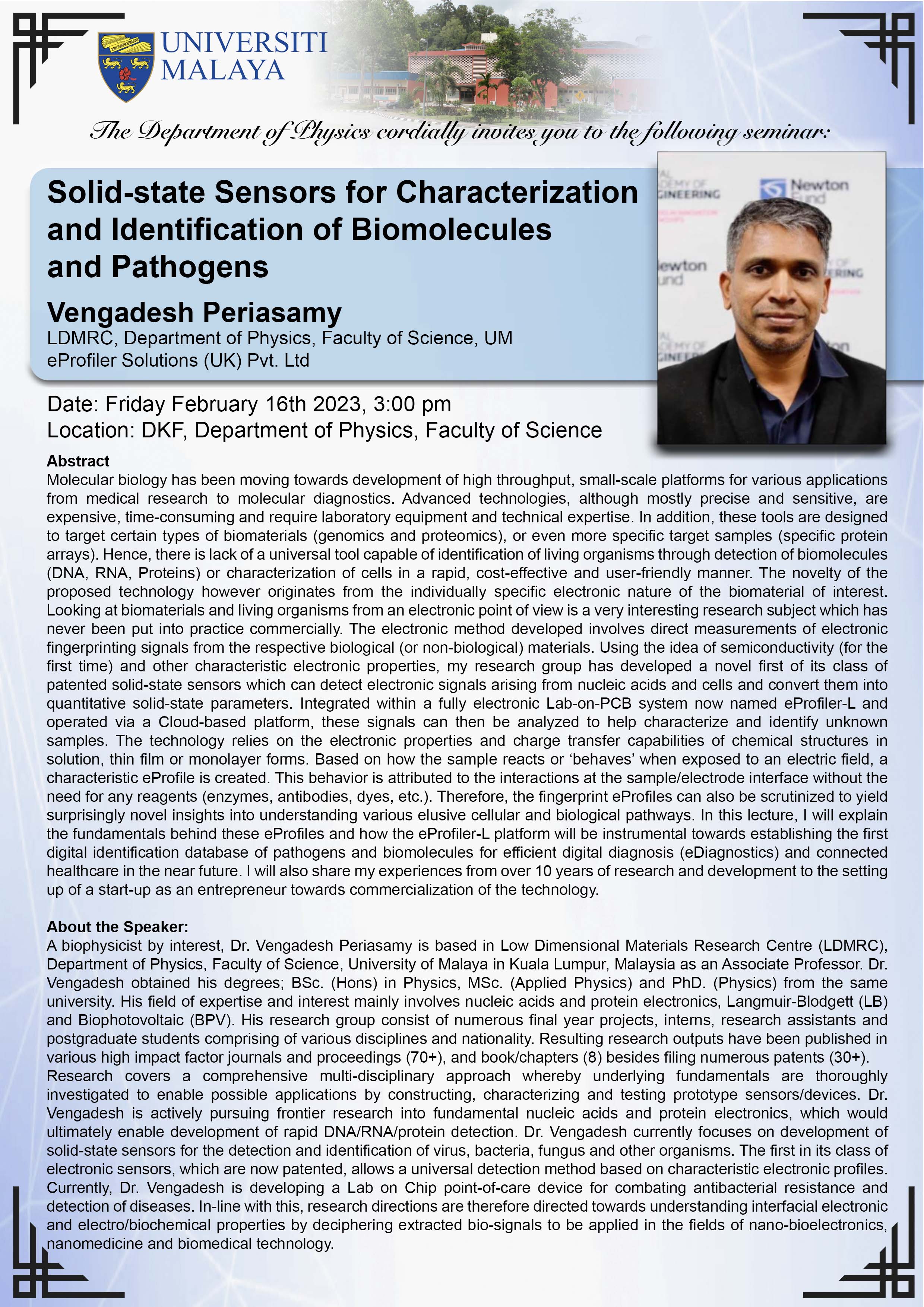The Department of Physics cordially invites you to the following seminar:

Title: Solid-state Sensors for Characterization and Identification of Biomolecules and Pathogens
Speaker: Dr. Vengadesh Periasamy (Low Dimensional Materials Research Centre, Department of Physics, Faculty of Science, University of Malaya)
Date: Friday 16th February 2024, 3:00 pm
Location: DKF, Fakulti Sains
Abstract
Molecular biology has been moving towards development of high throughput, small-scale platforms for various applications from medical research to molecular diagnostics. Advanced technologies, although mostly precise and sensitive, are expensive, time-consuming and require laboratory equipment and technical expertise. In addition, these tools are designed to target certain types of biomaterials (genomics and proteomics), or even more specific target samples (specific protein arrays). Hence, there is a lack of a universal tool capable of identification of living organisms through detection of biomolecules (DNA, RNA, Proteins) or characterization of cells in a rapid, cost-effective and user-friendly manner. The novelty of the proposed technology however originates from the individually specific electronic nature of the biomaterial of interest. Looking at biomaterials and living organisms from an electronic point of view is a very interesting research subject which has never been put into practice commercially. The electronic method developed involves direct measurements of electronic fingerprinting signals from the respective biological (or non-biological) materials. Using the idea of semiconductivity (for the first time) and other characteristic electronic properties, my research group has developed a novel first of its class of patented solid-state sensors which can detect electronic signals arising from nucleic acids and cells and convert them into quantitative solid-state parameters. Integrated within a fully electronic Lab-on-PCB system now named eProfiler-L and operated via a Cloud-based platform, these signals can then be analyzed to help characterize and identify unknown samples. The technology relies on the electronic properties and charge transfer capabilities of chemical structures in solution, thin film or monolayer forms. Based on how the sample reacts or ‘behaves’ when exposed to an electric field, a characteristic eProfile is created. This behavior is attributed to the interactions at the sample/electrode interface without the need for any reagents (enzymes, antibodies, dyes, etc.). Therefore, the fingerprint eProfiles can also be scrutinized to yield surprisingly novel insights into understanding various elusive cellular and biological pathways. In this lecture, I will explain the fundamentals behind these eProfiles and how the eProfiler-L platform will be instrumental towards establishing the first digital identification database of pathogens and biomolecules for efficient digital diagnosis (eDiagnostics) and connected healthcare in the near future. I will also share my experiences from over 10 years of research and development to the setting up of a start-up as an entrepreneur towards commercialization of the technology.
About the Speaker
A biophysicist by interest, Dr. Vengadesh Periasamy is based in Low Dimensional Materials Research Centre (LDMRC), Department of Physics, Faculty of Science, University of Malaya in Kuala Lumpur, Malaysia as an Associate Professor. Dr. Vengadesh obtained his degrees; BSc. (Hons) in Physics, MSc. (Applied Physics) and PhD. (Physics) from the same university. His field of expertise and interest mainly involves nucleic acids and protein electronics, Langmuir-Blodgett (LB) and Biophotovoltaic (BPV). His research group consists of numerous final year projects, interns, research assistants and postgraduate students of various disciplines and nationalities. Resulting research outputs have been published in various high impact factor journals and proceedings (70+), and book/chapters (8) besides filing numerous patents (30+).
Research covers a comprehensive multi-disciplinary approach whereby underlying fundamentals are thoroughly investigated to enable possible applications by constructing, characterizing and testing prototype sensors/devices. Dr. Vengadesh is actively pursuing frontier research into fundamental nucleic acids and protein electronics, which would ultimately enable development of rapid DNA/RNA/protein detection. Dr. Vengadesh currently focuses on development of solid-state sensors for the detection and identification of virus, bacteria, fungus and other organisms. The first in its class of electronic sensors, which are now patented, allows a universal detection method based on characteristic electronic profiles. Currently, Dr. Vengadesh is developing a Lab on Chip point-of-care device for combating antibacterial resistance and detection of diseases. In-line with this, research directions are therefore directed towards understanding interfacial electronic and electro/biochemical properties by deciphering extracted bio-signals to be applied in the fields of nano-bioelectronics, nanomedicine and biomedical technology.
Thank you.